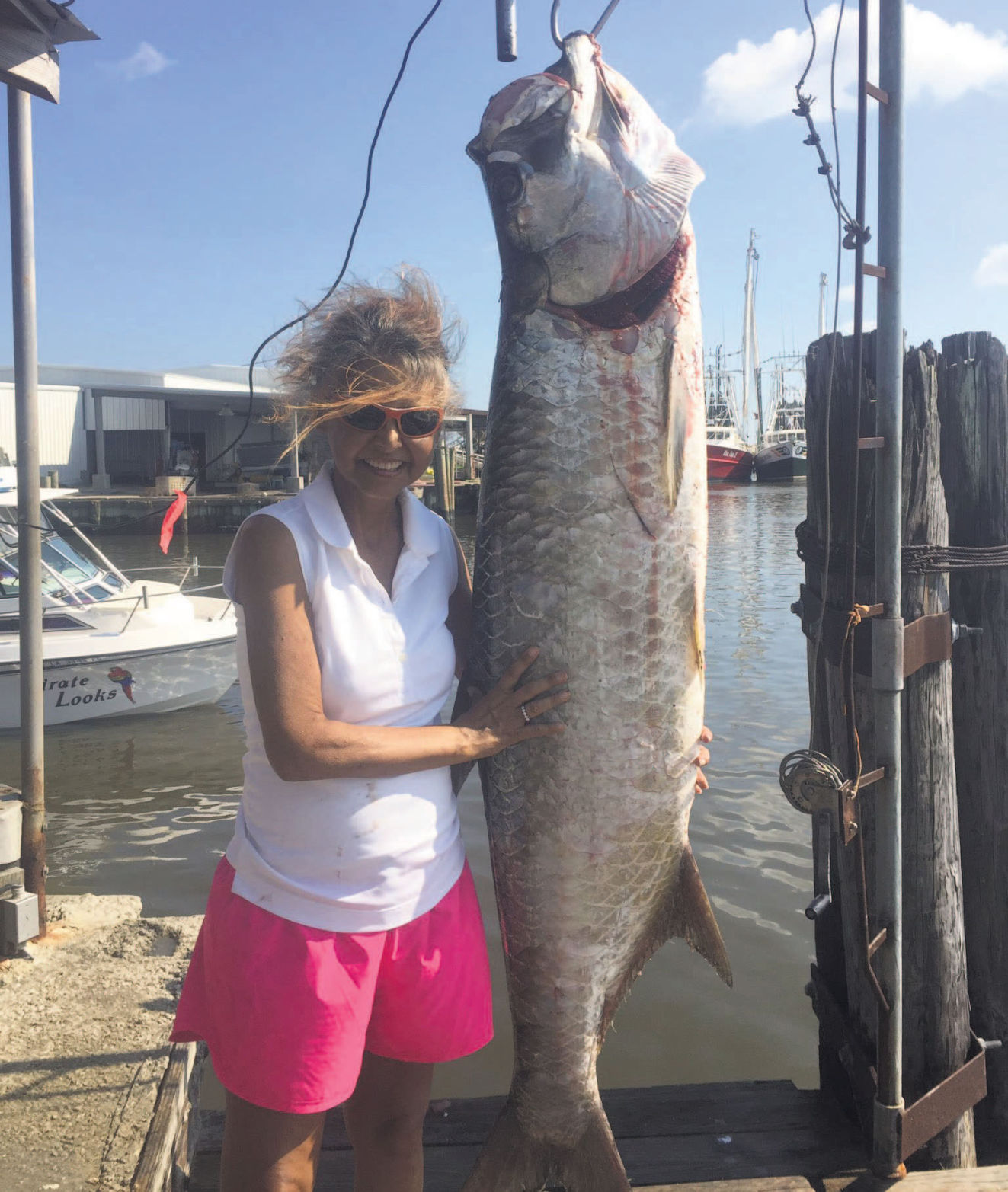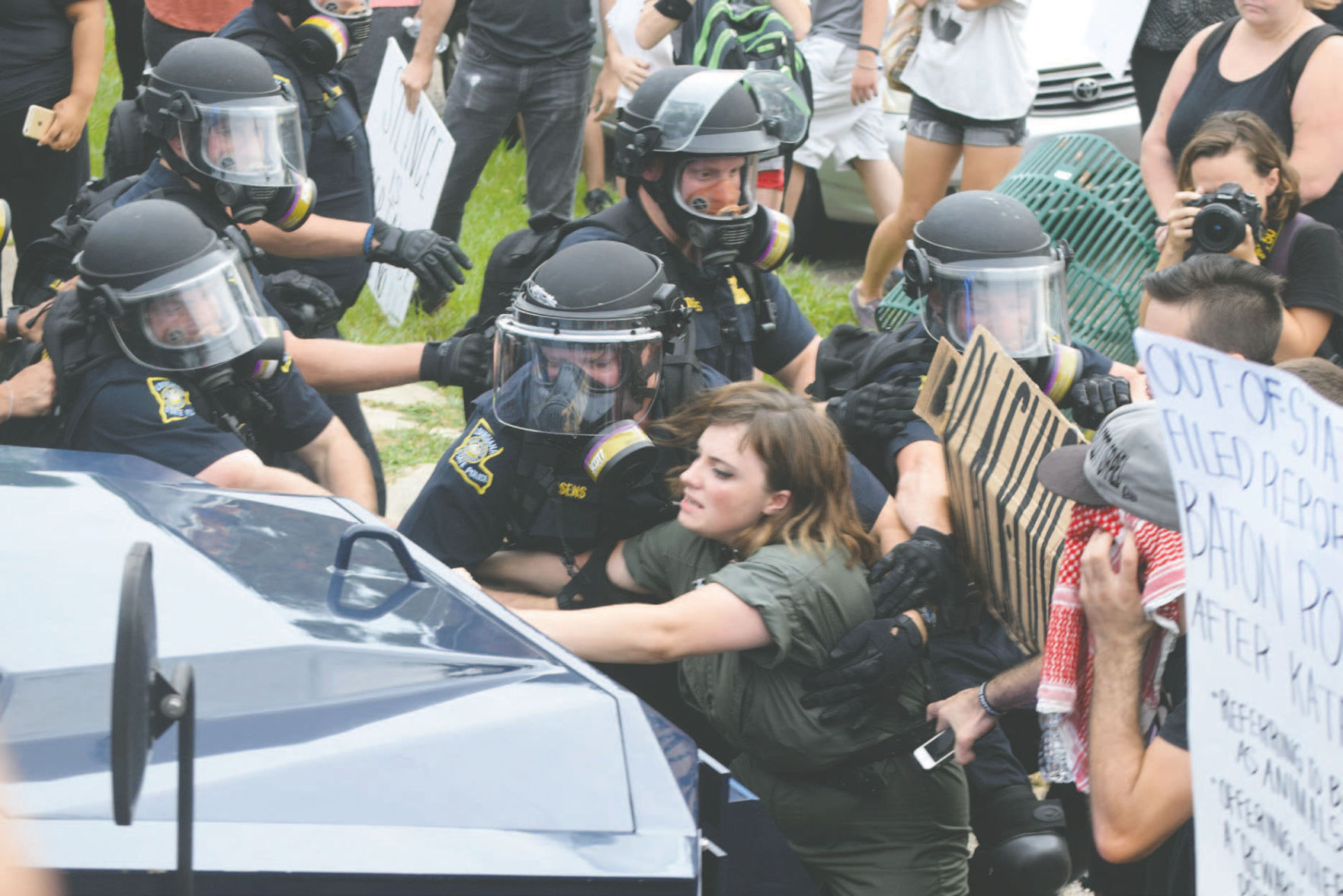
NAACP banquet a show of community unity
July 9, 2016
Grand Isle woman ends drought at Tarpon Rodeo
July 12, 2016Protests against a police shooting in Baton Rouge, another questionable police shooting in Minnesota and a hate-fueled gunman’s Dallas massacre of officers resulting in five deaths are touching local law enforcement officers and local residents in varying ways both up close and personal.
State troopers assigned to Troop C in Gray have already worked crowd-control assignments in Baton Rouge as demonstrators — including some from a local branch of the NAACP — protest the July 5th shooting of Alton Sterling, a black man, by a white police officer. Deputies from Lafourche and Terrebonne parishes are on stand-by to provide relief for those from other departments also assigned to demonstration duty.
Members of the Lafourche Parish branch of the NAACP have taken part in some of those marches.
On local streets, meanwhile, law enforcers of various agencies continue performing their duties 24 hours a day. They are more conscious than ever of the potential of tragedy for someone else’s family if they err at a critical moment, or for their own if they hesitate and end up not coming home again. They also mourn the officers lost to the Dallas atrocity, which amounts to a loss of family that demonstrates increased need for vigilance.
‘THOUGHTS AND PRAYERS”
Lafourche Parish Sheriff Craig Webre summed up feelings expressed by many local officers in interviews this week.
“Our nation is reeling from what is one of the most horrific acts ever perpetrated against law enforcement,” Webre said of the Dallas shootings. “The men and women of the Lafourche Parish Sheriff’s Office support our brothers and sisters of the Dallas Police Department and Dallas Area Rapid Transit through our thoughts and prayers in the wake of this horrific incident. This attack illustrates the danger and challenges our deputies face every single day. Just as Dallas Police officers ran toward the sounds of gunfire, even with their fallen officers before them, we will also not give in to fear. We will continue to protect and serve Lafourche Parish with the excellence you’ve come to expect, and the excellence you deserve. We hope you will support us in continuing to grow and unite our community-not divide it.”
Webre’s statement includes mention of the families coping with the shootings by officers.
“I ask our citizens to keep the families of the victims of this tragedy in your thoughts and prayers, as well as the families of all those involved in the incidents earlier this week in Baton Rouge and Falcon Heights.”
COPS WHO CROSS THE LINE
Terrebonne Sheriff Jerry Larpenter said truly bad police behavior must be addressed. But he asks as well why community and national outrage are not more visible regarding the long parade to the graveyard of young black men killed by friends, associates and rivals, occurrences that outnumber those killed by officers.
Larpenter said he strives mightily to remove “bad apples” from his department and looks for tell-tales that officers might be too quick to react in an unjustified fashion. Officers, he said, know what is expected of them.
“We are all trained the same way,” Larpenter said. “If someone does not comply with the verbal command it is hands on, you restrain him, you are taught to take an individual to the ground. If they keep posing a threat the use of force escalates. We are in a world where the police have to continue and arrest these bad guys and the criminal justice system is not playing its part, and the police try to apprehend someone and they refuse to give up, they refuse to comply, and the circumstances make a police officer have to kill somebody, it must be within the lines of what is called justifiable homicide. Police officers are trained and should know the difference, and when police officers cross the line they do not represent us.”
Officers interviewed throughout last week, in person as they started shifts or ended them, by telephone and text, shared thoughts and feelings with an understanding that they and their departments would not be specifically attached to their comments, since they are not usually authorized to speak publicly.
“You can’t not think about it,” said one patrol officer, confiding that the potential for error is an unfortunate given in every critical encounter.
“You can’t really think about that and let it affect what you do,” said another officer, who expressed confidence that in a crisis, rigorous training he has undergone will kick in and guide what actions are taken.
EVALUATION NEEDED
The officers understand that the stark nature of videos that show the shooting of Alton Sterling in Baton Rouge and the aftermath of Philando Castile’s shooting in Minnesota raise disturbing questions. But they also wish that television talking heads would not rush to judgement before all of the facts are in. The national discussion, however, has led some to ask whether current policies and training need to be evaluated, for greater margins of both officer and civilian safety.
“You get this real somber feeling that maybe we need to look at what we do,” a supervisor in one local department said. “I was told by a minister that maybe we need to have officers try harder to talk to people like they might ‘want somebody to talk to their mama.'”
Some supervisors are considering whether change in vocal inflection or initial handling of people when circumstances allow, might make risky encounters safer for civilians and officers.
Affirmative tones that grew stronger in the decades-long war on drugs might be better muted, some said. A greater emphasis on community relations and public outreach, some said, might ease the potential for violent confrontations.
The reality check imposed by the Dallas mass slaying of officers is causing some who patrol local streets to be more aware of their surroundings, despite beliefs that doing so is already second nature; the Dallas case makes emotions raw in ways many won’t or cannot discuss.
“I can’t allow myself to think of what it would be like to feel that I am more vulnerable,” one local officer said, when asked if he was feeling more like a target.
COMMON PRECURSORS
The risks are ever-present and can come at a moment’s notice. On Friday in Gray, Terrebonne deputies responded to a report of a man who had threatened both his mother and father with a gun, and was traveling through his neighborhood with the weapon.
Officers swarmed the neighborhood near Champion Drive and as they sought the person they were told he had said he would kill officers who tried to arrest him. Jamal Tillman was spotted and apprehended without a shot being fired. He had already ditched his weapon. Tillman was booked on two counts of aggravated assault with a firearm and one count of obstructing justice.
A day later deputies in Terrebonne searched streets in the normally quiet Broadmoor subdivision for a domestic violence suspect, who at one point was seen walking behind a house but disappeared. Had a foot chase resulted, potential for a negative encounter could have been great. Studies of police-related shootings show that a chase or street encounter is a common precursor.
The frustration for law enforcement officers in times like the present is that presumptions officers have acted outside the law in a shooting situation — particularly when the civilian is unarmed — are rampant, and not based on the highly technical standards that existing law and practice demand.
“In most cases the first narrative that comes out is never the full story,” said Sgt. Brennan Matherne of the Lafourche Sheriff’s Office. “In some cases it is even fabricated. Once the court of public opinion has decided it does not matter what the court of law decides. The public makes up its mind and there is no way to change that. You can have people clamoring over an injustice when there has not been a judgement yet, a decision based on all facts has not been made yet.”
NEW INFORMATION
In the Baton Rouge case, evidence is mounting that points to potential justification. On Monday the Baton Rouge Advocate reported new details of the Sterling shooting based on a search warrant affidavit filed in court. The newspaper cites
Baton Rouge Police and state troopers arrest a protestor during an anti-police brutality march in Baton Rouge on Sunday.
(From left) Deputy Corey Donaldson, Lt. Brian Falgout and Deputy Toby Fanguy search for a domestic violence suspect Saturday on Funderburk Avenue in Houma. They are among officers who performed their duties throughout the weekend as a national spotlight glares on law enforcement practices and the nation mourns the deaths of five police officers in Dallas.










